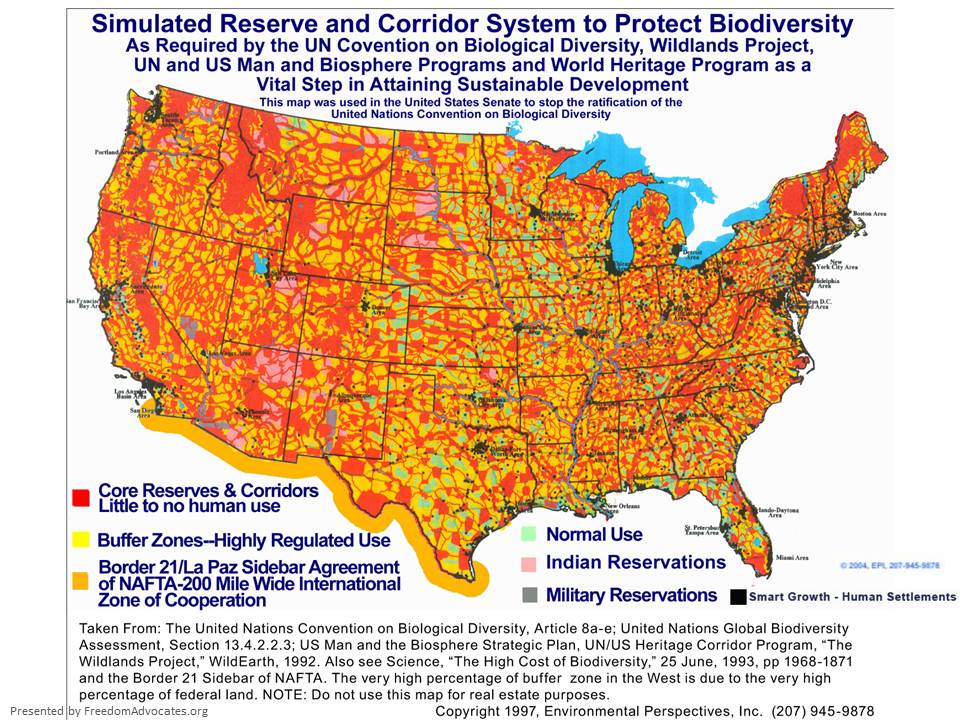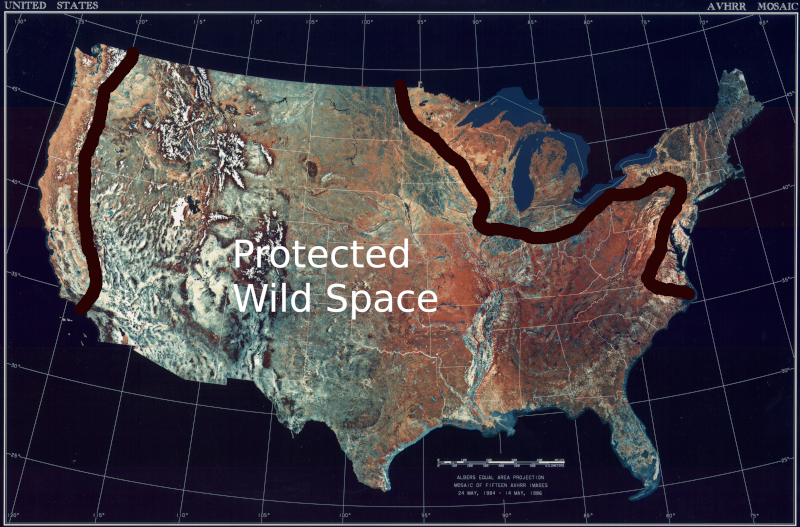Legislative
Texit, rewilding, and casus belli
Texans got a signal that Texit is vital to their survival: pilot projects for highway removal, a necessary part of rewilding.

At last report, Dan Miller of the Texas Nationalist Movement is planning an April 8th “Capitol Day” rally in Austin. He has a serious problem. Though the Texit Bill (HR 1359) is in the House State Affairs Committee, they have not scheduled a hearing. This looks uncomfortably like “chubbing,” and Mr. Miller very much suspects that it is. So he wants his followers to come to the Capitol to demand action on that bill. It must pass so that Texans will have a vote on whether to stay in the Union. And “President” Joe Biden just gave Texans good cause to secede, something closely akin to casus belli.
Grievances provoking Texit
As CNAV said earlier, Texas already has many grievances against the United States today. The overturning of the Election of 2020 emboldened the Democrats. In fact, it made them bold enough to provoke Texans worse than the federal government provoked the Confederate States, even going back to the 1832 Nullification Crisis under then-President Andrew Jackson.
To be more specific, the Congress has before it certain bills to:
- Strip from the several States all power over their own elections. The Texas Senate has already moved to tighten the rules. Congress’ HR 1 would all but abolish any and all election rules.
- Substitute fearfully lax rules that would remove all confidence in the justice of an electoral result.
- Take a step toward the confiscation of all firearms.
- Declare a person’s gender to be perpetually fluid.
But now comes the latest, in the form of the Biden Infrastructure Bill. Of the craziness in that bill, others have commented already. This part caught CNAV’s eye, and is directly relevant to Texit. It appropriates $20 billion for pilot projects to tear down existing highways that happen to run through “black and brown neighborhoods.”
Further particulars on the Biden infrastructure bill
Again, as others have observed, the Biden Infrastructure Bill closely resembles the Green New Deal of Rep. Alexandria Ocasio-Cortez (D-N.Y.). Recall that “AOC” proposed many things, including without limit:
- Restricting the amount of energy available (including tearing down nuclear power plants)
- Forbidding the doing of certain classes of thermodynamic work (like flying or air freight), and
- Abandoning animal husbandry and restricting farming to hydroponic gardening.
You can find hints of the above, and more, in this FAQ that she never actually intended to release. Someone on her staff did the country a favor by releasing it.
When “President” Biden released his Infrastructure Bill for public comment, AOC immediately criticized it. But her objection was that it did not provide a big-enough budget! The Infrastructure Bill budgets $2.25 trillion, but she said, “We can do ten trillion!”
(Justice Democrats, by the way, held auditions for far-left candidates to “primary” the “old fuddy-duddies” in the House Democratic Caucus. AOC won her audition, which brings us to where she, and we, are today.)
But the bill, as it stands, is bad enough without a $10 trillion budget. For it budgets $20 billion for a curious sort of pilot project.
The highway teardown project – and what that has to do with Texit
Again to be specific, this bill budgets $20 billion to tear down highways that ran through “black and brown neighborhoods.”
The Biden-Harris administration has judged, without going to court, that whatever compensation certain displaced residents got for the taking of their homes to build highways through their neighborhoods, was not and can never be enough. “Racist!” they cry, and actually with some local prompting, at least in one case. In 1968, the government built part of Interstate Highway 10 – the Claiborne Expressway – through the New Orleans neighborhood of Tremé. Resident Amy Sally has tilted at windmills to have the government tear the Claiborne Expressway down. Her neighbors dismissed her quest as wishful thinking. But “President” Biden, needing an excuse, seized upon the Tremé story. Nor did he stop there; he took up a similar complaint in Syracuse, N.Y., about a stretch of Interstate 81 that also runs through a predominantly black neighborhood.
What do pilot highway teardown projects in Louisiana and New York State have to do with Texas or Texit? Just this: the Department of Transportation has halted a proposed extension of Interstate Highway 45 in Houston, Texas. Furthermore, the Federal Highway Administration is suing the State of Texas to halt any planning or facilitation of that extension.
The right way and the wrong way to address eminent domain
These cases all involve eminent domain – the inherent power of any government to take private property for public use. Under the Constitution, any government, when taking private property, must pay for it. Sadly, “just compensation” really sets no standard. So it could be fair-market value or a settlement, with or without negotiation. But the time to stop an abuse of eminent domain is before groundbreaking on the “public use”! After fifty-three years, surely it’s too late for that. Though not too late for any remedy – but the remedy ought to be to have a court of law determine:
- Whether the initial compensation satisfied the “just compensation” requirement of the Constitution, and if not,
- What level of compensation would be just, and
- Who must pay it.
The precedent for this already exists. During the War Between the States, the United States Army expropriated the house and grounds of the Robert E. Lee Plantation, called Arlington. They used the house for a hospital and buried the dead on the land. After the War, the Lee estate sued the government for the compensation General Lee never got. On 4 December 1882 the U.S. Supreme Court ruled 5-4 that the government took the property illegally. The Lee estate settled for a payment of $150,000, a payment that would be worth $4 million today. Today we know that property as Arlington National Cemetery, and the house as the Robert E. Lee Memorial.
What tearing down a highway really means
Any student of Constitutional law should remember the example of Lee v. U.S. So why not follow that example and offer to pay the homeowners, or their survivors, greater compensation? Because this isn’t about compensation in an eminent-domain case. SecTrans Pete is making an excuse, and a worse than lame one.
Instead, this is about funding several pilot projects for highway removal for the sake of highway removal. And why would anyone do a thing like that? Because it is an essential element of rewilding.
Rewilding, as CNAV explains here, means reverting land and especially riverbanks, lake shores, and coastlines, to how the land lay before any human being ever set foot or made landfall on it. Rewilding is a necessary part of the Agenda for Sustainable Development of the United Nations. This agenda has had the various names of:
- Agenda for the Twenty-first Century (Agenda 21), and now:
- Agenda for the Two Thousand Thirtieth Year of the Common Era (Agenda 2030).
Texit advocates, take note! This is what Agenda 21/2030 would mean
The first rewilding plan, the United Nations Convention on Biological Diversity, spoke in general terms about conserving wildlife and wildlife habitat. Dr. Michael S. Coffman, in 1997, drew this map to show exactly what that would mean for the United States:

As any observer can see, following the Coffman Map would restrict human beings to several disconnected districts. “Core reserves and corridors” and “buffer zones” would surround them.
That map also shows a collection of already large cities, especially at the corners of the Texas Triangle. (The corners of the Texas Triangle are three twin-city pairs: Dallas-Fort Worth, Austin-San Antonio, and Houston-Galveston.) Today land use, especially in the Triangle, is under restriction, so much that housing has run short and is expensive. Yet we now hear of a proposal to force all Texans to live within the Triangle and abandon the rest of the State to the wild.
That’s bad enough, but the globalists might have a real, and much worse, plan. At best, the Coffman Map, or even a hypothetical restriction of Texans to the Triangle, would be a compromise. Globalists do not compromise. The regard all non-globalists as rubes, who will and must do as the globalists tell them. So forget the Coffman Map! This is what the globalist plan for the “Lower Forty-eight,” and for Texas, would look like!

In other words: the globalists would love to re-wild all of Texas, and all the Red Areas of the USA.1
Another reason for Texit
So Texas has another reason to sue – or fight – for its independence. Neither the Texas Nationalist Movement nor the Texas Legislature should ignore the deadly serious signal they now have from Washington. Pilot projects for highway removal, whatever the pretext, can signal one thing only. And that is an attempt to revert ninety percent of the land area of the United States to the wild. In turn, the most efficient plan, from the globalist point of view, is to evacuate the Red Areas and change the land to make it look and feel untouched by human hands, feet, or human-built machines.
That kind of change requires not merely stopping highways (as is happening in Houston), but removing them. And the Biden Infrastructure Plan funds pilot projects for precisely that.
So where are you, all you Texans? You seem to have a set of bored legislators who plan to “chub” away your right to vote on independence. They’ll wind up “chubbing” away the entire State if you let them. So, don’t.
List of earlier articles relating to Texas independence and readiness
Editor’s Note
1 Alaska would likely become “Inuit Nunaangat,” or “The Abode of the Inuit,” or, less politically correctly, “Eskimoland.” Hawaii might resume its former status as a sovereign kingdom. Perhaps, then, Senator Maisie Hirono (D-Hawaii) would become Queen Maisie of the House of Hirono.
Terry A. Hurlbut has been a student of politics, philosophy, and science for more than 35 years. He is a graduate of Yale College and has served as a physician-level laboratory administrator in a 250-bed community hospital. He also is a serious student of the Bible, is conversant in its two primary original languages, and has followed the creation-science movement closely since 1993.
-

 Accountability2 days ago
Accountability2 days agoWaste of the Day: Principal Bought Lobster with School Funds
-

 Constitution2 days ago
Constitution2 days agoTrump, Canada, and the Constitutional Problem Beneath the Bridge
-

 Executive21 hours ago
Executive21 hours agoHow Relaxed COVID-Era Rules Fueled Minnesota’s Biggest Scam
-

 Civilization20 hours ago
Civilization20 hours agoThe End of Purple States and Competitive Districts
-

 Civilization4 days ago
Civilization4 days agoThe devil is in the details
-

 Executive4 days ago
Executive4 days agoTwo New Books Bash Covid Failures
-

 Civilization3 days ago
Civilization3 days agoThe Conundrum of President Donald J. Trump
-

 Executive4 days ago
Executive4 days agoThe Israeli Lesson Democrats Ignore at Their Peril















[…] – two opposing voices Texas, power, and bad money Texit – if the vote were the other way Texit, rewilding, and casus belli Texit debate heats up as deadline approaches Texit – gambit before […]